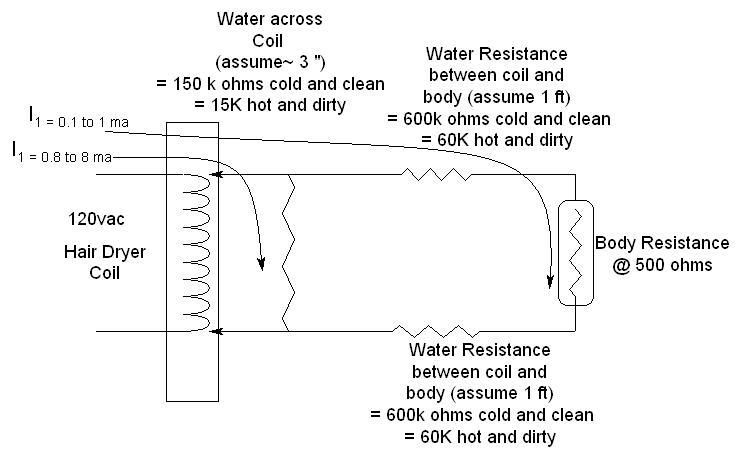- Location
- Lockport, IL
- Occupation
- Semi-Retired Electrical Engineer
OK, we are either agreeing by saying ?I don?t agree,? or we are disagreeing by saying ?You are right.? Let?s try this again.
If the tub truly is isolated, no metal nearby at all, then any current that flows through the water (and the bather) will start at the hot leg, and return via the neutral. This will not trip the GFCI.
If the tub is not completely isolated, if the pipe is metal for example, then the current that passes through the bather?s body can return to the source via the metal pipe. This should trip the GFCI.
One more thing: Even if the tub is ?isolated,? as described above, and even if all the home?s pipes are plastic, and there is no GEC connection to a water pipe, then while the tub is draining there is another possible path for the current to take. If the serving utility uses metal pipes, even 10 feet or more from the home, current can flow through the water, into the utility?s metal water pipe, then through the dirt to the home?s ground rod. I strongly suspect that if a hair dryer is accidentally dropped into the tub, the bather will remove it before starting to drain the tub. But if the tub has started draining, and if the person knocks the hair dryer into the tub while trying to step out of the tub, there might be a shock, and a GFCI device would stop that shock from becoming fatal.
If the tub truly is isolated, no metal nearby at all, then any current that flows through the water (and the bather) will start at the hot leg, and return via the neutral. This will not trip the GFCI.
If the tub is not completely isolated, if the pipe is metal for example, then the current that passes through the bather?s body can return to the source via the metal pipe. This should trip the GFCI.
One more thing: Even if the tub is ?isolated,? as described above, and even if all the home?s pipes are plastic, and there is no GEC connection to a water pipe, then while the tub is draining there is another possible path for the current to take. If the serving utility uses metal pipes, even 10 feet or more from the home, current can flow through the water, into the utility?s metal water pipe, then through the dirt to the home?s ground rod. I strongly suspect that if a hair dryer is accidentally dropped into the tub, the bather will remove it before starting to drain the tub. But if the tub has started draining, and if the person knocks the hair dryer into the tub while trying to step out of the tub, there might be a shock, and a GFCI device would stop that shock from becoming fatal.

